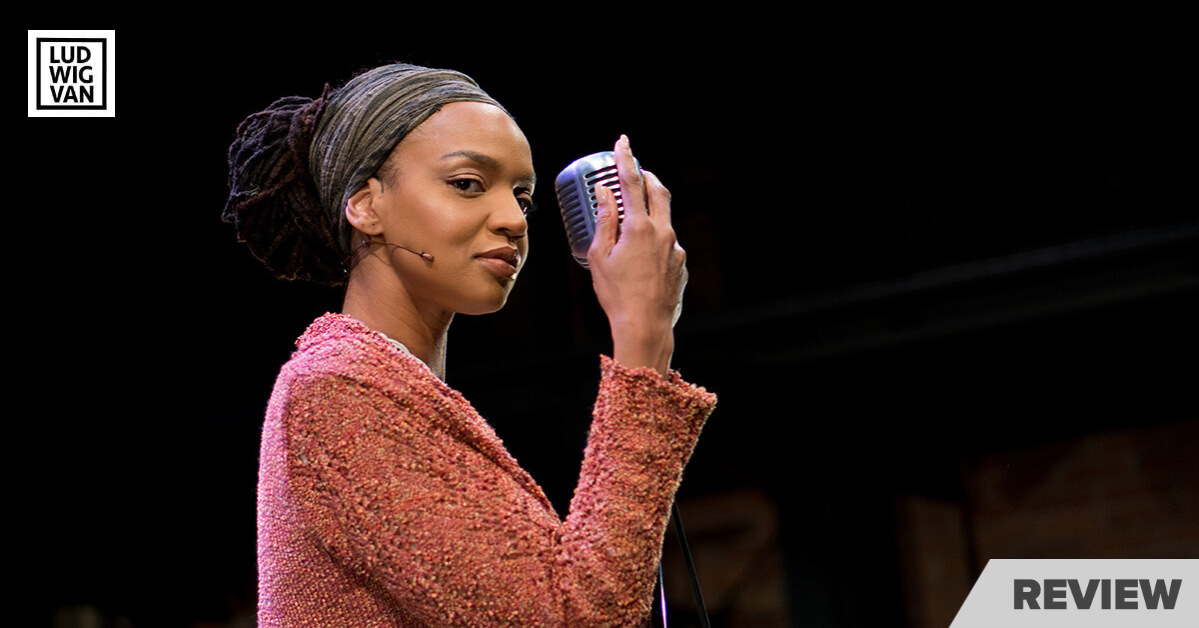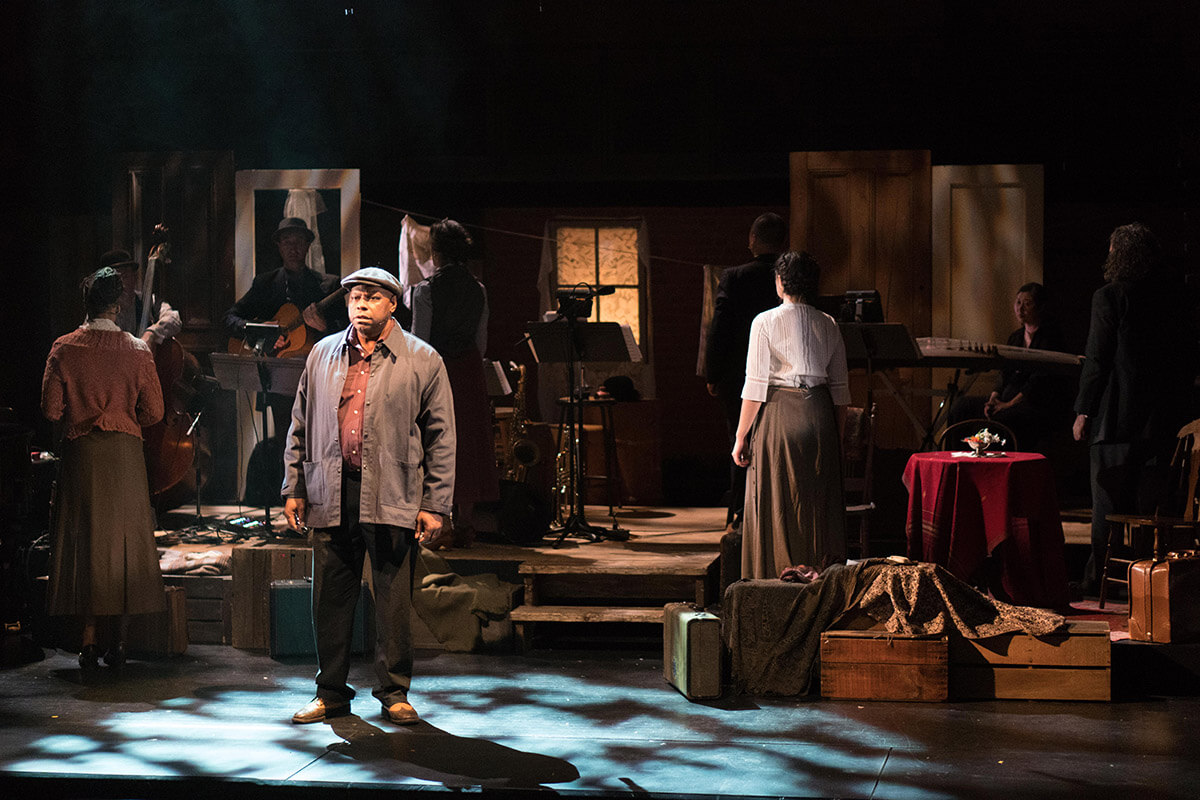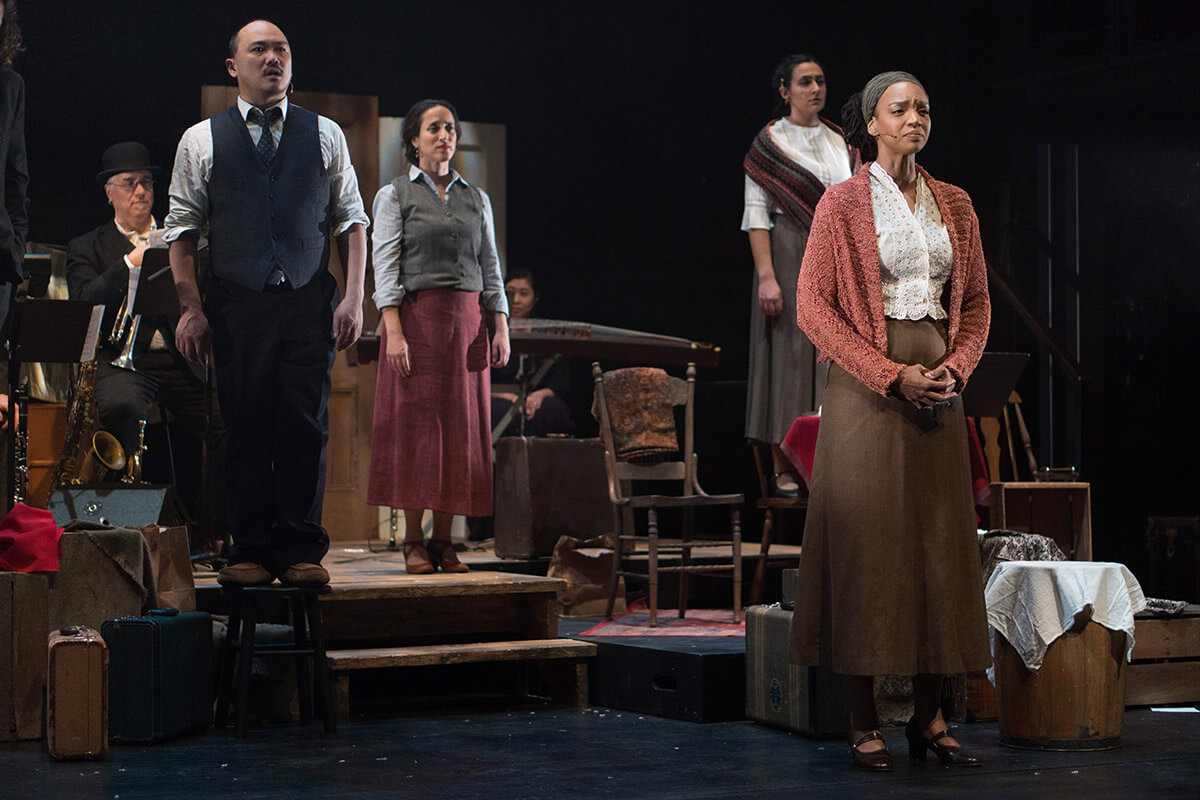
DB Works, Small World Music & Harbourfront Centre/tThe Ward Cabaret, written by Marjorie Chan, co-directed by David Buchbinder and Leah Cherniak, Harbourfront Centre Theatre, Dec. 12 to 22. Tickets available at wardcabaret.com.
The Ward Cabaret is one of those grand ideas that has a lot going for it, but in the end, is close but no cigar. The music is fabulous, the performers are splendid, but Marjorie Chan’s script is, alas, disappointing. It’s a show where the shoulda, coulda, woulda is still to be found. Nonetheless, the stirring music is reason enough to haul yourself down to Harbourfront to catch an evening of sparkling entertainment.
St. John’s Ward, called simply The Ward, was Toronto’s first multicultural neighbourhood, and its worst slum. Bordered roughly by Queen, University, College and Yonge Sts., Elizabeth St. was its main drag. What you will find there today is Nathan Phillips Square, New City Hall, and a plethora of Sick Kids and Toronto General Hospital buildings. Only the strip of Chinatown along Dundas is a reminder of the vibrant clash of cultures that once was The Ward.
The Ward Cabaret is an homage to the waves of immigrants and the stories, songs and traditions that they brought with them to this densely-populated neighbourhood between the mid-nineteenth century and World War II. When the Anglo-Protestant city fathers happily razed The Ward to the ground, they erased an important part of Toronto’s history, which The Ward Cabaret is trying to reclaim. The focus of the show is on the Jewish, Italian, Chinese and African-American population of The Ward. In fact, the Irish, who came first, are nowhere to be found. Presumably, they have been pushed off to Cabbagetown and points east.

The ambitious show is the brainchild of polymath David Buchbinder, musician, composer, bandleader and cultural inventor, who is equally at home in jazz and world music. To put the show together, Buchbinder worked with artists from the various cultural groups, as well as the four editors who compiled the essays that make up The Ward: The Life and Loss of Toronto’s First Immigrant Neighbourhood (Coach House Books, 2015). It was this book, which was the wellspring of Buchbinder’s inspiration for the show, and two of the editors, John Lorinc and Michael McClelland, are executive producers for the production. Since 2016, The Ward Cabaret has gone through workshop performances at Soulpepper, Lula Lounge and the Luminato Festival, as it transformed itself from a concert into a full-scale theatrical production.
Which brings us to Chan’s script; while we do get some real-life stories, such as the runaway American slave who was one of the first Blacks to settle in The Ward, the Jewish cantor who became the toast of New York (Lady Eaton paid for his singing lessons), and an Italian family who opened up a hotel, for most of the time, the characters are amorphous cyphers. We see them working in the Eaton family factories, falling in love, and celebrating weddings and births, but we have no specific characters to hook into.
When Chan gets concrete, however, the show becomes really interesting, such as the recitation of Toronto the Good’s Blue Laws about what you cannot do on a Sunday, or a woman, waiting for her sister to immigrate, only to find out that her ship has been lost at sea. Equally fascinating is a letter by a good citizen, written in 1906, deploring southern Italian immigration because they are semi-barbarians, and therefore, should not be allowed into the country. The entire script should have been specifically constructed on the experiences of real named people, and not nebulous illusions thrown out here and there in a general catchall. For example, the characters eating their first coconut comes out of left field. Often, the cast spouts poetic lines where it is impossible to connect the dots to any action. I was left wanting more.

The music, however, is rich indeed, with members of the awesomely talented cast specializing in genres: Jewish klezmer and cantorial music (Aviva Chernick and Mitch Smolkin), Black gospel and blues (Kaisha Lee and Jeremiah Sparks), Italian songs of love and grief (Cara Krisman), and Cantonese opera and Chinese popular song (Derek Kwan). The cast members also join their colleagues when an ensemble is needed, be it an Italian socialist anthem (“Avanti Popolo”), or an a cappella gospel choir (“I Open My Mouth to the Lord”). Sparks also does double duty on the piano, and with Kwan, is listed as an associate artist, and so, presumably, contributed material. Buchbinder (trumpet/fluegelhorn), as always, has surrounded himself with a supremely gifted group of musicians including Michael Occhipinti (guitar/banjo) who helped develop the show, Jacob Gorzhaltsan (clarinet/saxophone), Louis Simao (bass/accordion/organ), and Cynthia Qin (the Chinese guzheng).
The motif of co-directors Leah Cherniak and Buchbinder is to manipulate beat-up suitcases and wooden crates throughout the show, to emulate the cramped boarding houses and crowded streets of The Ward, and it works well. Victoria Wallace designed the basic tiered set, which puts the band and the singer/actors in close quarters, but it does flow. Her period costumes seem to evoke post World War I, a good choice because it places The Ward in the middle of its lifespan, and the cast are clearly working folk, given their attire. Simon Rossiter has had to be clever with spotlighting different areas of the stage at different times, while choreographer Monica Dotter has given us both a joyful Jewish hora and a wildly spirited Italian tarantella, among other dances.
Because of the weakness of the script, we get an impressionistic feeling of The Ward, rather than a strong vital picture that captures the pulsating life of these newcomers. Chan is a much better writer than The Ward Cabaret would indicate, but she has to go back to the drawing board. In the meantime, the flimsy narrative is just a hook upon which to hang some fantastic music.
#LUDWIGVAN
Want more updates on classical music and opera news and reviews? Follow us on Facebook, Instagram or Twitter for all the latest.



